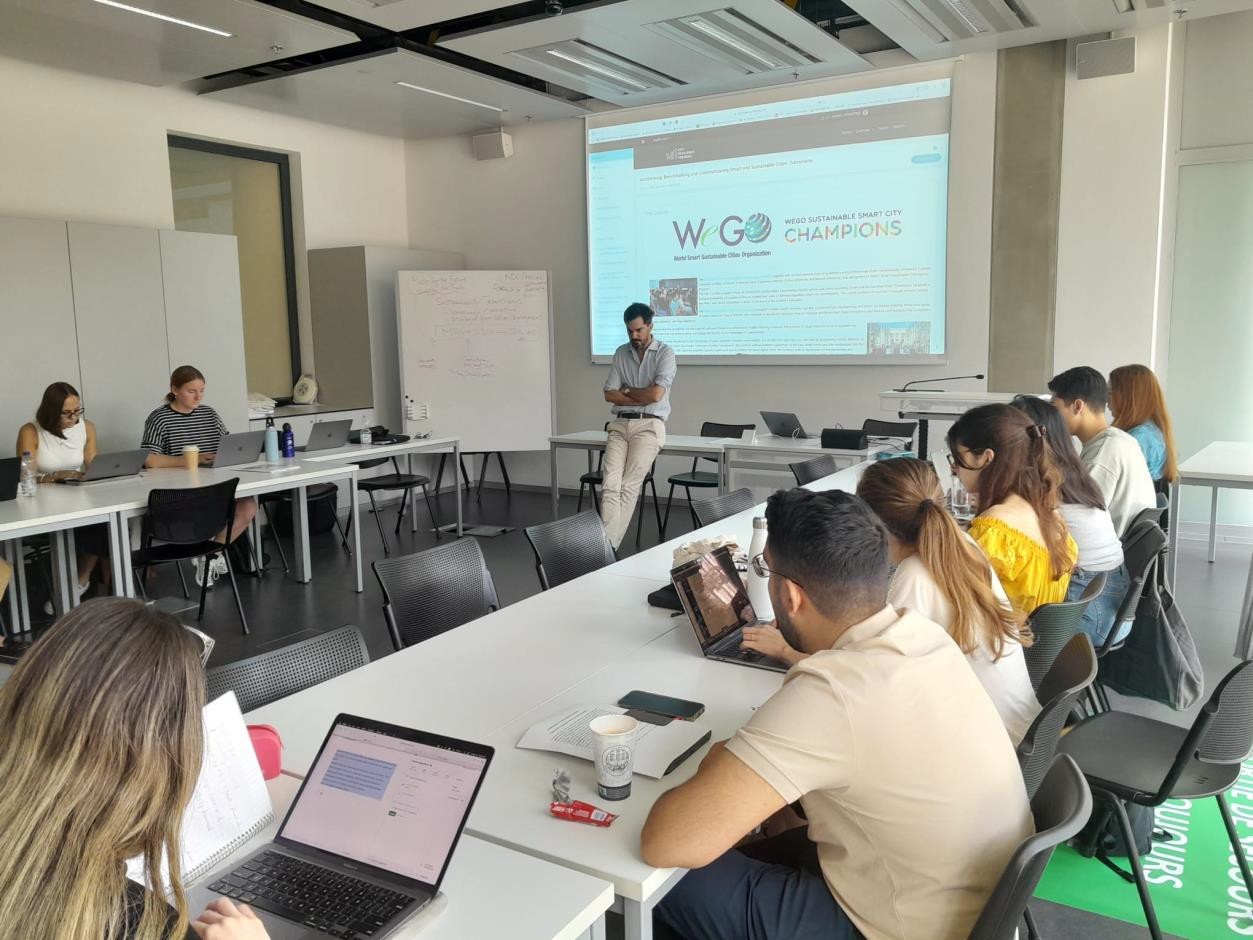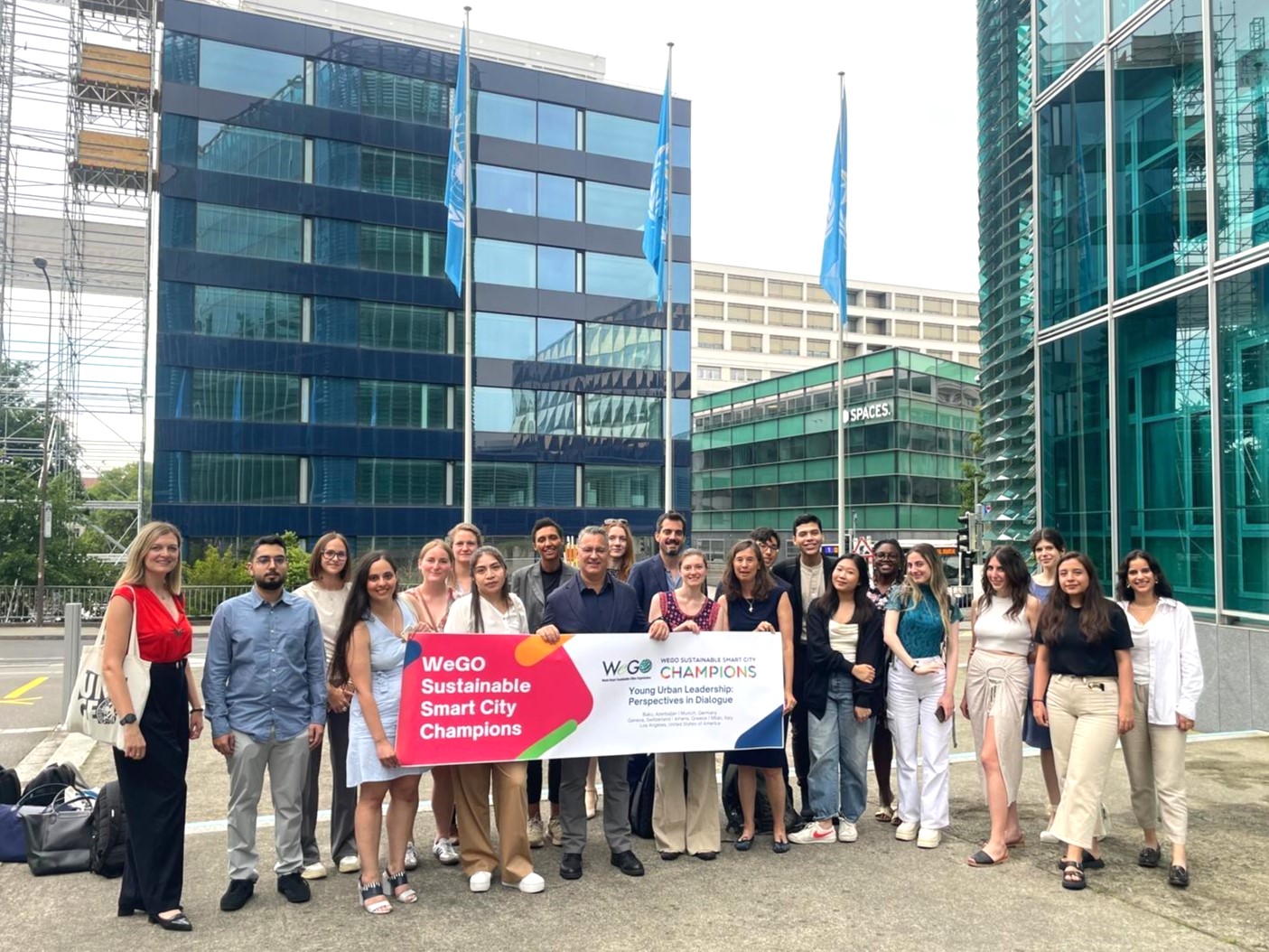WeGO Sustainable Smart City Champions Launches Second Session in Geneva: Advancing Climate Action Through Collaboration
Geneva, June 27-28th, 2024 – Held for the second time in Geneva on June 27-28, 2024, this WeGO Champions Session successfully convened 19 participants, including PhD candidates, for an intensive exploration of climate change, science-policy integration, and environmental communications.
The event’s first day featured an insightful session at the World Meteorological Organization (WMO), titled “What People Want for Climate Change.” This event was the result of a joint initiative by the United Nations Development Programme (UNDP) and WMO, aiming to convert public opinion into actionable climate policies. The session presented findings from the 2024 People’s Climate Vote, the largest global public opinion survey on climate change, gathering over 75,000 responses from 77 countries.
Keynote speakers included Stephen Fisher, Professor at Oxford University; Ko Barrett, WMO Deputy Secretary-General; and Laura Bullon-Cassis, Postdoctoral Researcher at the Albert Hirschman Centre on Democracy.
Discussions centered on translating citizens’ aspirations into ambitious policies to limit global temperature rise to 1.5°C. Case studies from Denmark, Chile, and Indonesia showcased successful climate policy implementations and underscored the pivotal role that smart sustainable city initiatives play in climate action. For instance, Denmark’s integration of renewable energy into urban infrastructure, Chile’s investment in smart public transportation, and Indonesia’s community-based waste management systems demonstrate how smart city strategies enhance climate resilience and sustainability. By leveraging advanced technologies and data analytics, these cities are effectively reducing their carbon footprints, improving energy efficiency, and creating more livable urban environments.
The second day involved a session led by Dr. Mialy Rann from the Geneva Science-Policy Interface, emphasizing the intersection of science and policy. This session underscored the necessity of evidence-based policy-making and the crucial role of scientists in advising policymakers. In the context of smart cities, this means using real-time data and predictive modeling to address urban challenges such as energy consumption, waste management, and air quality. The integration of IoT (Internet of Things) devices and smart grids in urban planning allows for more efficient resource use and better environmental monitoring, directly contributing to climate goals.
The concluding session, conducted by Prof. Matteo Tarantino from the Catholic University of Milan, focused on environmental communications. It highlighted the importance of strategic communication in raising public awareness and mobilizing collective action on climate change. Participants examined various tools and techniques to effectively engage diverse audiences, including policymakers, the general public, and communities directly impacted by climate change.
This session highlighted how in smart sustainable cities, effective communication through digital platforms, smart city dashboards, and social media can significantly improve the dissemination of climate-related information and encourage sustainable practices. By making climate data accessible and understandable, cities can cultivate a more informed and engaged citizenry, essential for the success of sustainable urban initiatives.
The WeGO Champions Session in Geneva served as a dynamic platform for young leaders and experts to address pivotal issues surrounding climate change. The event highlighted the vital need to integrate public opinion, scientific research, and effective communication in formulating robust climate policies. Additionally, by linking climate action with smart sustainable cities, the event underscored the critical need for integrated approaches to urban planning and climate resilience. Smart cities, leveraging technology and data, can play a pivotal role in achieving climate goals by promoting energy efficiency, reducing carbon footprints, and enhancing the overall quality of urban life.
About WeGO
The World Smart Sustainable Cities Organization (WeGO), is a membership-based international association of local governments, smart tech solution providers, and institutions committed to the transformation of cities into smart sustainable cities through facilitating public-private partnerships (PPP). WeGO was founded by 50 member cities in 2010 as the World e-Governments Organization, hence our acronym. In response to the evolving concept of smart cities, WeGO expanded its vision and mandate at the 7th General Assembly (2017) and its name to the World Smart Sustainable Cities Organization. WeGO’s Secretariat is based in Seoul, Korea, and has regional offices in East Asia (Chengdu, China), the Mediterranean (Beyoglu, Turkey), Africa (Abuja, Nigeria), Middle East & North Africa (Abu Dhabi, United Arab Emirates), Latin America (Cuenca, Ecuador), and Central Asia (Almaty, Kazakhstan). As the leading platform on smart city development, WeGO’s mission is to share knowledge and good practices in e-Governance; strengthen administrative efficiency and transparency; advance digital capacity; facilitate civic involvement; bridge the digital divide and inequality; and promote cooperation solidarity among cities and local governments around the world.
WeGO serves for its members as their international platform to improve the quality of life, innovate in the delivery of public services, and strengthen regional competitiveness.
Press Contact:
Name: Kakim Danabayev
E-mail: kakim@we-gov.org
Phone: +82-70-4202-9169



